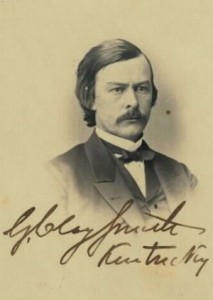 Green Clay Smith (1826-1895), born in Richmond, Kentucky and a lawyer by profession, is an officer in the United States Army. In May, Smith helped rout Confederate forces commanded by John Hunt Morgan at Lebanon, Tennessee. Formerly a colonel, today he is appointed as brigadier general of the Fourth Regiment of the Kentucky Volunteer Cavalry.
Green Clay Smith (1826-1895), born in Richmond, Kentucky and a lawyer by profession, is an officer in the United States Army. In May, Smith helped rout Confederate forces commanded by John Hunt Morgan at Lebanon, Tennessee. Formerly a colonel, today he is appointed as brigadier general of the Fourth Regiment of the Kentucky Volunteer Cavalry.
Smith is also a politician. He is elected to the U.S. House of Representatives as an Unconditional Unionist from the 6th district of Kentucky in 1862, taking his seat in Congress on March 4, 1863. On December 4, 1863 Smith resigns his commission with the Kentucky Fourth Cavalry, and on March 13, 1865 is brevetted major general for his service during the war. Remaining in Congress until the summer of 1866, Smith is then appointed, by U.S. President Andrew Johnson, Governor of Montana Territory on July 13, 1866. He remains governor of Montana until April 9, 1869, at which time he resigns and moves back to Washington, D.C.
Shortly thereafter, Smith, a Baptist, moves back to his home state of Kentucky and is ordained as a minister. In the years following, he pastors churches in Frankfort, Winchester, Mount Sterling and Somerset, among others. He also serves as an evangelist, and while preaching a revival meeting in Williamsburg in 1883, assists in the founding of the First Baptist Church of Williamsburg.
Nevertheless, Smith does not forsake politics altogether. A temperance advocate at a time when Baptist opposition to alcohol is growing, Smith is the candidate of the National Prohibition Party in 1876, receiving 9,522 votes. Many Baptists don’t vote for him because of the Baptist heritage of church state separation.
In 1890 Smith returns to Washington D.C., becoming the pastor of the Metropolitan Baptist Church of the capital city, where he remains until his death in 1895.
Few Baptists who serve in the Civil War achieve such prominence in the years following as does Green Clay Smith.
Sources: “Green Clay Smith, Major General, United States Army,” Arlington National Cemetery Website, including image (link); “Green Clay Smith: A Civil War Biography,” Civil War Interactive (link); “Green Clay Smith,” Baptist History Homepage (link); “History of First Baptist Church, Williamsburg, Kentucky,” FBC website (link)


